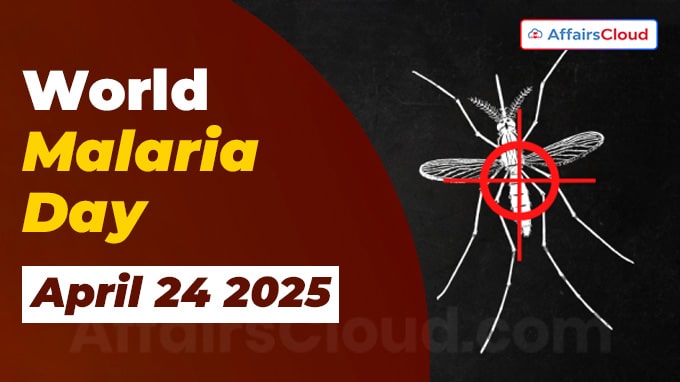 World Malaria Day (WMD) is observed annually on April 25 across the globe as an initiative of the World Health Organization (WHO) to raise awareness, mobilize resources, and promote actions aimed at the prevention, control, and elimination of malaria.
World Malaria Day (WMD) is observed annually on April 25 across the globe as an initiative of the World Health Organization (WHO) to raise awareness, mobilize resources, and promote actions aimed at the prevention, control, and elimination of malaria.
- The theme for WMD 2025 is “Malaria Ends With Us: Reinvest, Reimagine, Reignite”, aiming to re-energize efforts at all levels, from global policy to community action, to accelerate progress towards malaria elimination.
- In 2025, the WHO joins forces with the Roll Back Malaria (RBM) Partnership to End Malaria.
Background:
i.WMD was established by WHO member states during the World Health Assembly (WHA) of 2007.
- The first World Malaria Day was observed on 25 April 2008.
ii.The concept of WMD stems from Africa Malaria Day, initiated in 2001 by African countries following the Abuja Declaration, signed by 44 malaria-endemic countries at the African Summit on Malaria.
About Malaria:
i.Malaria is caused by Plasmodium parasites transmitted via bites of infected female Anopheles mosquitoes.
ii.Species like Plasmodium falciparum (deadliest) and Plasmodium vivax pose the greatest threat.
iii.It is a non-contagious disease, and only 40 of 400+ Anopheles species transmit malaria, primarily in tropical regions
Prevention and Treatment:
i.WHO recommends two vaccines for malaria prevention:
- RTS, S/AS01 (approved in 2021) and R21/Matrix-M (approved in 2023) are WHO-recommended vaccines for children in high-risk areas.
- 19 African countries are deploying these vaccines, with Sudan targeting 1.3 million children by 2026
ii.Tools: Insecticide-Treated Nets (ITNs), indoor spraying, chemoprevention, and rapid diagnostics.
Key Statistics and Global Burden:
i.According to the World Malaria Report 2024, 263 million new cases and 597,000 deaths occurred globally in 2023, with 95% of cases and deaths concentrated in the WHO African Region
ii.45 countries and 1 territory (e.g., Egypt, certified malaria-free in 2024) have eliminated malaria. Of the 83 malaria-endemic countries, 25 reported fewer than 10 cases in 2023.
iii.2.2 billion cases and 12.7 million deaths have been averted since 2000, but progress has stalled due to funding gaps, climate crises, and conflict
India’s Progress in Malaria Elimination:
i.India has shown significant progress, with malaria cases dropping from 11,69,261 in 2015 to 2,27,564 in 2023, marking an 80% reduction.
ii.Malaria deaths decreased from 384 in 2015 to 83 in 2023, also an 80% reduction.
WHO’s New Operational Strategy for 2024–2030:
i.In 2024, the WHO Global Malaria Programme (GMP) launched the “Global Malaria Programme Operational Strategy 2024–2030” to reshape global malaria trends and accelerate progress toward elimination by 2030.
ii.The strategy focuses on four key objectives:
- Develop and disseminate norms and standards to guide effective malaria control.
- Stimulate the development and timely introduction of new tools and innovations to combat emerging challenges.
- Promote the use of strategic information for targeted interventions and impact assessment.
- Provide technical leadership in coordinating the global malaria response.
About World Health Organization (WHO):
Director General (DG) – Dr. Tedros Adhanom Ghebreyesus
Headquarters – Geneva, Switzerland
Founded – 1948




